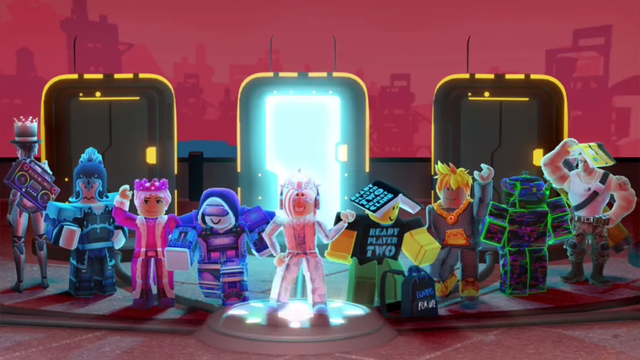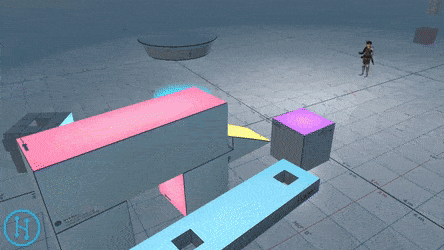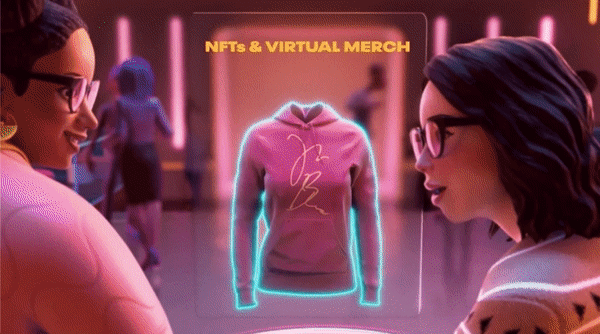David Chalmers is a leading thinker in the field of consciousness. His academic career began in mathematics but slowly turned to cognitive science and philosophy of mind. He eventually worked at Indiana University under Douglas Hofstadter, whose book Gödel, Escher, Bach: The Eternal Golden Braid won him a Pulitzer Prize.
—David Chalmers
In 2007, about a million people flocked to Second Life, eager to experience the web-based 3D alternate reality that had been available since before 2003.
In Second Life, players can customize and cartoonize their avatars as their in-game avatars, roaming around in their avatar form and enjoying a variety of activities.
Players can listen to humorous live lectures by Kurt Vonnegut, dance at dream nightclubs like Hot Lick and Angry Ant, buy virtual clothing and merchandise at Armani stores, visit famous landmarks like Rockefeller Center, and invest in virtual digital real estate.
image description
▼ "Second Life", if you are given a second life in VR, would you still want to live in the real world?
So, when Zuckerberg talks about the Metaverse, part of the puzzle is that he wants to reinvent "virtual reality" beyond just running games or social apps on Facebook's Oculus VR headset to access the Metaverse world.
"The metaverse is the vision for the entire industry," Zuckerberg said in an interview with The Verge in July. "It exists across many companies."
secondary title
01. General artificial intelligence
We will develop new worlds and new creatures with powers greater than our own.
The avatar in the metaverse is simply a person's general artificial intelligence, that is, a new creature called general artificial intelligence was born in the new world of the metaverse.
image description
▼"Western World", a human-like artificial intelligence that can talk and reason...
Philosopher David Chalmers believes that general artificial intelligence is possible. Some people predict that general artificial intelligence may be 10 or 20 years away. According to David Chalmers, "I would be surprised if these people turned out to be right. There has been a lot of exciting recent progress in deep learning, which focuses on methods for finding patterns in raw data."
In David Chalmers' view, deep learning is well suited for what we do perceptually as humans - image recognition, speech recognition, etc. But when it comes to anything that requires autonomy, reasoning, decision-making, creativity, etc., AI is only useful in limited areas.
image description
▼ A Robot Taught Itself Chess, Beating a Grandmaster
Once humans have human-level artificial intelligence, there is no doubt that it will change the world. How should I describe it? To paraphrase David Chalmers: AGI will be creatures that will initially have the same powers as us, and soon after, will become much more powerful than we do.
David Chalmers likes to study human consciousness, and likes to distinguish intelligence from consciousness. For him, intelligence has to do with the behavioral capabilities of these systems: what they can do, what output they can produce given an input.
When it comes to intelligence, the central question is, given some problems and goals, can you figure out the right way to achieve your goals? If you can, that's a sign of intelligence. Consciousness is more a matter of subjective experience.
secondary title
02. Opaque veil
Even if consciousness is a reproducible epiphenomenon of a correct information-processing system with a correct representational structure, there will always be an opaque veil separating behavior that appears to be inspired by subjective experience from behavior that is actually inspired by subjective experience.
image description
▼What is hidden under the opaque veil?
Regarding the above question, in philosophy, it is an old question of other thought. How do you know if another person or system has a mind? I know I have brains.
Descartes said, "I think. That's one thing I'm sure of. Therefore, I am." But when it comes to other people and computers, you don't have that much certainty.
What should the standard be? Is just doing complicated things enough to convince you that a system is conscious? Winning a game of Go certainly isn't. Being able to have intelligent conversations would be a start.
In the metaverse, maybe an artificial intelligence system could describe its state of consciousness to me and say, "I'm feeling miserable right now. I'm going through this hurtful, happy, or sad experience." That might be more important.
Perhaps most of all, in David Chalmers' view, is the confusion over its mental state: "I know objectively that I'm just a collection of silicon circuits, but internally, I feel more."
image description
▼Roblox's Metaverse Vision
It struck David Chalmers that the way to buy in the virtual world is to think about gradually transforming yourself into "AI You be the AI": gradually uploading.
Gradually replace neurons with computer parts, one at a time, or upload them to a computer. Start with a fully biological system, then you're three quarters biological and one quarter silicon, then half biological and half silicon, then quarter biological and three quarters silicon, and finally you're a full silicon system.
secondary title
03. Kantianism
One can imagine the metaverse, not just becoming a general artificial intelligence, but non-destructively merging with it.
In a future where virtual reality augments everyone with perfect computing power, perfect memory, perfect ability to synthesize and deploy knowledge, will collaboration be inevitable?
image description
▼ "Infinite 3D Digital World" is just a gallery that enters the virtual world to display encrypted art
Hopefully we can find a good solution to climate change like that. In 30 seconds, resolve the Israeli-Palestinian conflict? Maybe it's a harder one. In David Chalmers’ view, “much of the irrationality we have is collective. Some of our irrationality has to do with our goals, with me rationally wanting my goals and you rationally wanting yours related to the goals.”
The usual solution is that we all get the second most desired result, or the third, and so on. However, people are not very good at solving this type of solution.
Perhaps a whole new template is needed to compromise, looking for goals we can generalize to. But it's not simply means-to-end instrumental intelligence, it's more reflective, like figuring out what our ends should be.
image description
▼ Kijaidesign 3DP gallery designed by Jukka Seppanen - POKE on AltspaceVR
And here comes another question: between Kant's existence and the way we invent our own way to our own demise, how do we position our vision of the future?
I believe that everyone cherishes the history of mankind very much and selfishly wants it to continue with the future. Then human beings, as organisms composed of cells, are vulnerable to nature and the universe. So "how important is it for the human future to be biological?"
At some point, we'll have to face the fact that the substrates running our intelligence will be faster than our own. If we want to cling to our biological brains, humans risk being left behind in a world of superfast, superintelligent computers. Ultimately, the problem facing humanity is this: humanity must upgrade.
Another possibility is that we're immersed in a metaverse world where new AI identities take over and there's no place for humans. Maybe humans will be relegated to some virtual world or some designated part of the physical world, that would be second class.
image description
▼The resurrection poster of "The Matrix" reveals the new crew of Neo and Trinity, the fusion of the virtual world and the real world
secondary title
04. "Virtuality" and "Demon Problem"
The word "virtual" originally meant "false" or "as if".
Now might be a good time to define virtual reality, after all there are so many ways the word "virtual" is being used these days. Metaverse describes the word "virtual" vividly and excitingly.
image description
▼Facebook computer-generated metaverse virtual storefront
Here is a question to ponder: In what sense is normal reality real, and can virtual reality be real in that context? This is also the criterion for distinguishing the "metaverse dream" from the "real dream". A simpler understanding is, to what extent do we accept the "virtual environment"?
This is a great philosophical question. The great Irish philosopher George Berkeley once said, "To be is to be perceived." If something looks like a duck and sounds like a duck, it is a duck. This is idealism: the world is in your head.
However, the prevailing view is that reality is outside your head. To be real, you need more than appearances, you need some underlying strength or potential.
The great Australian philosopher Samuel Alexander gave a definition of "real man" - "to be real man, there must be causality". But there is a premise, if you can become someone who can really make a difference.
Philip K. Dick also once said, "When you stop believing in it, it doesn't go away." If you have something independent of your mind, it has causal power, and you can get through all these ways perception. But for the most part, it's a long way from reality.
image description
▼DreamVR,A virtual tree that exists in a virtual world
Suppose you are in a virtual world, where there are objects you can perceive, even if I am not around, the virtual tree will fall down.
Virtual trees have causality. A virtual tree falling can be experienced. It can break what it drops in the virtual world, and it can be experienced. Virtual reality is just another form of reality, but it's still completely real.
Someone here will ask "Isn't virtual reality just an instantiated fantasy?" This is a bit similar to Descartes's "devil problem".
René Descartes said, "How do you know you're not being fooled by an evil demon right now into thinking it's real and none of it is real?" The problem with virtual reality is a bit like Descartes' demon problem.
An analogy to the modern version, "How do you know you're not in the Matrix? How do you know you're not in a computer simulation where all of this looks real but none of it is real?"
Even a movie like The Matrix can easily lead to the "this is evil" gut feeling. "It's not true. No, it's all fake."
image description
▼Do you dare to enter the underworld with the actors looking for Pandora X?
We know from modern science that the world is not like that. A color is simply a set of wavelengths produced by the physical reflective properties of an object that create a certain experience in us. Solidity? Nothing in the world is truly reliable.
Things are mostly empty spaces, yet they have the causal power to produce solid experiences in us. Even space and time are gradually being dissolved by physics, or at least reduced to something simpler.
Physical reality now looks a lot like virtual reality. David Chalmers thinks it's okay to take the attitude, "It's worse for physical reality. It's not true." And yet it turns out that we just accept all of this and say, "Well, things don't Not as we imagined, they are still real."
secondary title
05. "Mother-child set" relationship
image description
▼ Metaverse virtual space, join Zeus and Hera on Mount Olympus
It's kind of like a multiverse. This is not to say that there is no objective reality. Perhaps there is an objective universe that contains all that exists. Maybe there's a Tier 1 universe where people create simulations and virtual realities, sometimes simulations within simulations, who knows how many layers. This may also be the goal Zuckerberg wants to achieve, "to create a first-level metaverse, and other metaverses are just subsets of it."
David Chalmers once speculated that "we are at level 42 of the universe." One thing to remember is that in "The Hitchhiker's Guide to the Galaxy" they programmed a computer to find the answer to the ultimate question of life, the universe and everything .
Years later, the computer says, "The answer is 42." What question might be important enough that this might be the final question and the answer might just be a simple number? Well no maybe the question is "What level of reality are we at?"
At the same time, imagine these virtual worlds tracking their own unique historical processes, political system evolution, cultural evolution, etc.? Intuitive feeling is the case.
image description
▼HP, VR virtual character performance
But wizards don't want all that power, so they throw it all at democracy. Most virtual worlds that exist today are corporate, owned and ruled by corporations. For example, Second Life, owned by Linden Lab.
However, this has its own problems. Ownership of physical reality is democratized. No overlord can switch or change the rules at will. A popular concern in turn is: Isn't the lack of democratized ownership a serious risk in virtual worlds?
There's going to be a lot of virtual environments, not sure if we should think like, "You choose your virtual world, and then you're always subject to the governance of the one company that owns it."
secondary title
06. Virtualization
In the end, we're all wondering if we'll eventually transition from physical reality to metaverse virtual reality on a civilization-scale.
image description
▼In the Metaverse, you can also browse social networking sites with your mobile phone
Assuming physical reality is a zero-level reality, there will always be resources that can be found there. We're always going to need more and more resources, "Let's blow up the sun and use it to power our computers. But that's not enough! We also need to travel across the galaxy to other places." As you can imagine, what a game resource-dependent technology arms race.
It's easy to imagine that 99% of the population will live in a virtual world, especially if the physical world goes awry in the wake of nuclear devastation or dire climate change.
At that time, the virtual world will become more interesting and enjoyable, there will be some desire to appear, some people like to be in the zero-level world, some like to live in the city, and some like to live in the country.
image description
▼Microsoft's masterpiece, shopping in the metaverse mall, the degree of fidelity is infinitely close to reality
The virtual world will not be a panacea to solve human problems. It may be like the Internet, and some wonderful things may happen, and some terrible things may happen.
But it will provide room for the full range of the human condition, and in that sense it will at least be on par with physical reality. Maybe we'll find some unique way to make virtual reality better, to bring more freedom and justice, but maybe not.
But at least it's an open and exciting future!



